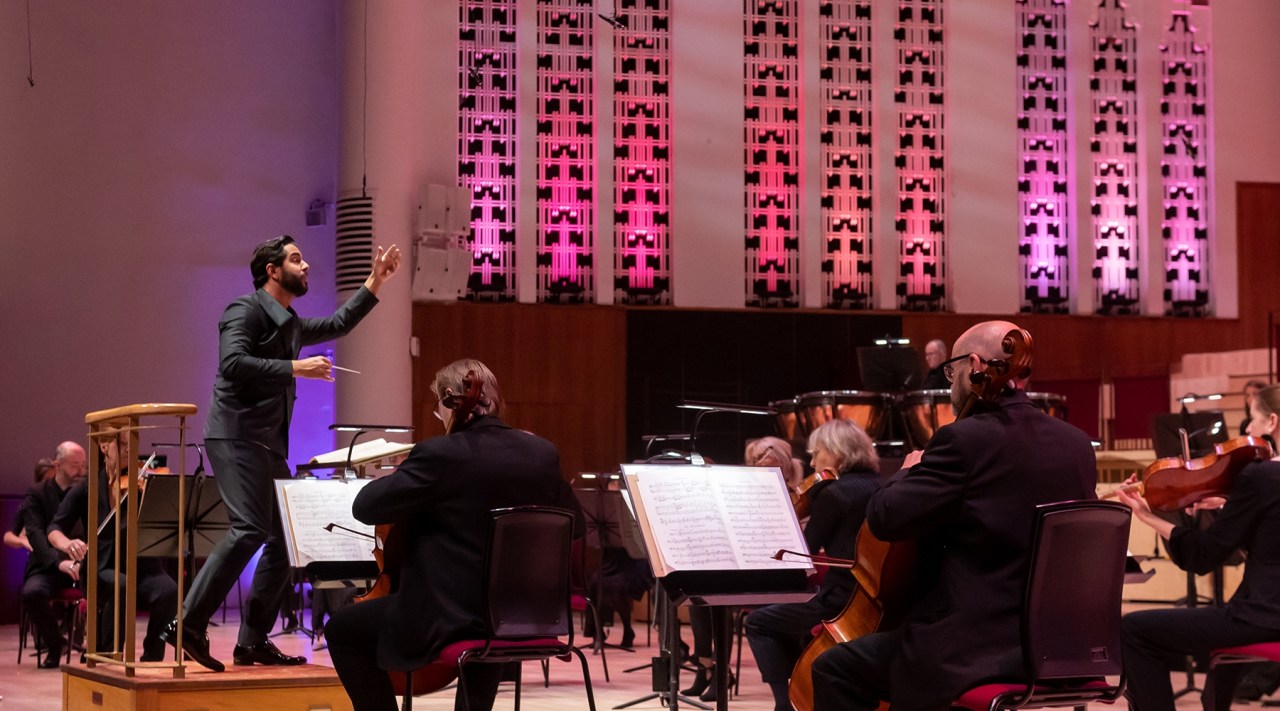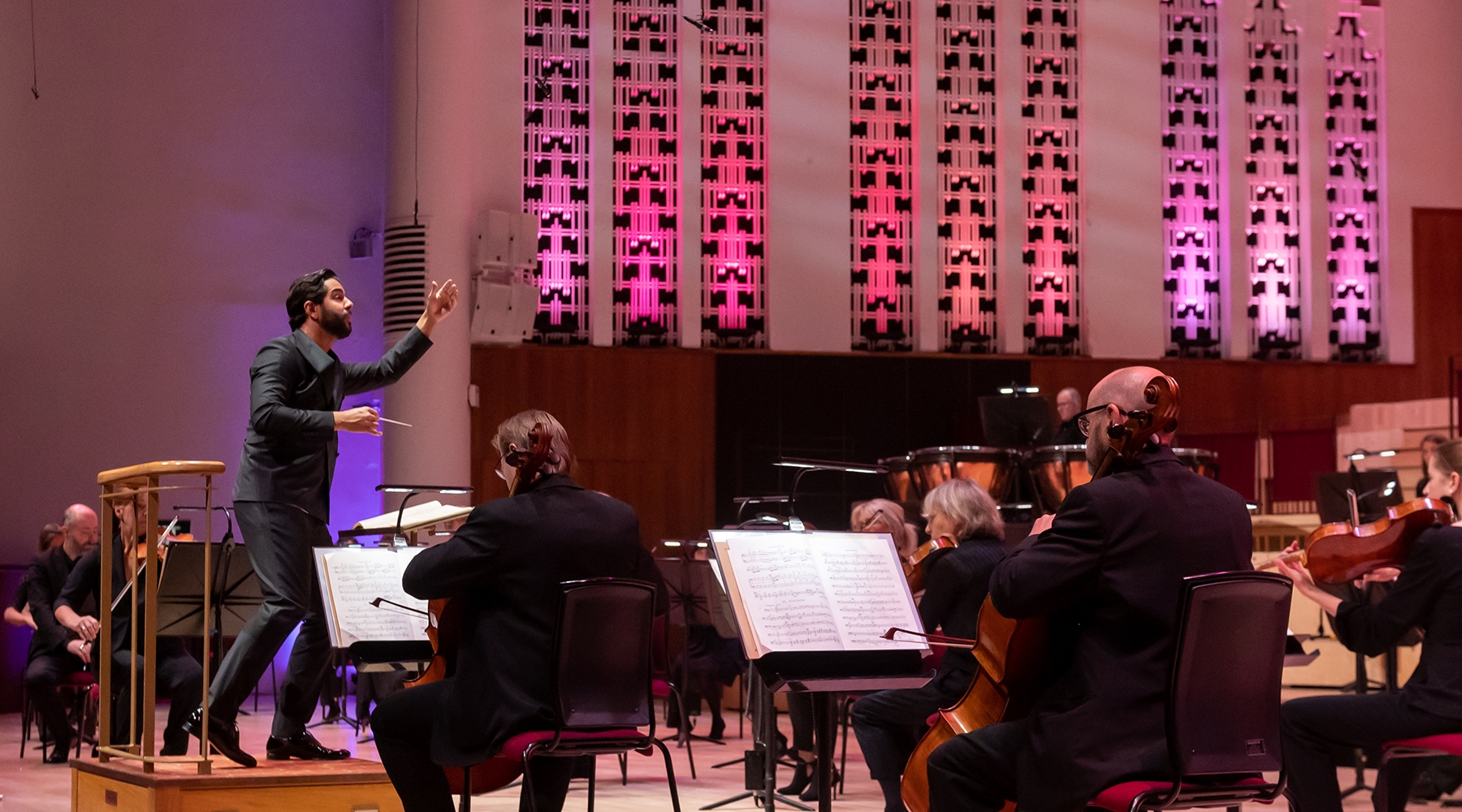There was no printed programme for the Royal Liverpool Philharmonic Orchestra’s first concert under its music director designate Domingo Hindoyan. Nothing to download either; just a piece of paper the size of a train ticket, handed out by a steward with a conspiratorial air, containing a bare listing of the pieces we were about to hear. Stravinsky, Ravel and Prokofiev: fair enough. Known quantities. But about the second item on the programme — the world première of a new Trombone Concerto by Dani Howard —there was no information at all beyond that all-or-nothing title.
All to the good, you might think: pure music and unprejudiced listening. There’s no such thing, of course. From the moment the performers walk on stage, you’re making assumptions about what to expect; in this case a work unafraid of the raw power of its soloist, the young trombone virtuoso Peter Moore, and ready to use every colour of a full symphony orchestra. Three movement titles (blink and you miss ’em) were projected on to the back wall of the Philharmonic Hall — ‘Realisation’, ‘Rumination’ and ‘Illumination’.
If we hear John Adams in Dani Howard, it’s because we don’t yet know Dani Howard
But then the first sounds strike the ear and the mind immediately tries to grasp something recognisable — to construct meaning. In truth, that usually means spotting influences — in this case, chugging rhythms on the strings, and sudden flashes of melody. So there’s your obligatory hint of John Adams (A Short Ride in a Fast Machine is surely the single most influential orchestral work of the late 20th century, at least in the Anglophone world). But someone else is present too, looming out of the rustling stands of neatly coppiced quavers in long brass notes that begin in near-silence and coalesce into huge banks of sound. Why, Jean Sibelius! Still here, after all these years?
This is the easiest trap to fall into when listening to new music, and one that’s weighted against the unfamiliar. If we don’t hear the influence of Stamitz on Mozart, it’s because we no longer know Stamitz. If we hear John Adams in Dani Howard, it’s because we don’t yet know Dani Howard. The trick is to take this one-off encounter and try to remedy that. Howard’s rhythmic momentum and warm palette make an effective setting for a solo trombone. Moore dispatched the score’s musical gymnastics as gracefully as he made his instrument sing (and his tenor register has the old-gold mellowness of a virtuoso horn player). There’s a sense of fantasy too. The central ‘Rumination’ begins as a trombone soliloquy but evolves into a hall of sonic mirrors, with the orchestral brass echoing, imitating and quietly enlarging on the solo line.
Whether by accident or design, Howard’s concerto also played to Hindoyan’s strengths as a conductor — which on this first short encounter I’d summarise as a natural command of long lines, coupled to an elegant baton technique that caresses the sound until the emotion streams out. No open-necked informality here: standing bolt (not to say Boult) upright in his tailcoat, Hindoyan is a commanding figure, and his Ravel (Le Tombeau de Couperin) felt simultaneously intimate and vast. Like Howard, he seems to know exactly where he’s going, and the concerto drew cheers. Anyway, it’s all going to be available online shortly, and you should listen and decide for yourself how wrong I am. Critics, eh? They never learn.
Grange Park Opera — that’s the one in Surrey, not the one at Grange Park (don’t ask) — opened its season with Bryn Terfel playing against Natalya Romaniw’s Alice Ford in a new production of Verdi’s Falstaff. The Stockbroker Belt audience at West Horsley likes its celebrity names, and it likes to see where its money is going. Stephen Medcalf’s brisk period staging did the job neatly, with the BBC Concert Orchestra under Gianluca Marciano dancing all over Verdi’s miraculous score.
The casting was the thing here, though; one of those occasions (not as common as you might suppose) where a pair of stars somehow merge their public personas with their roles. We’ve known Terfel for so long that we don’t really care about the threadbare patches on that once-lustrous voice. It’s all one with his portrayal of Falstaff as a grizzled, touchingly vulnerable old horndog — sitting crumpled and damp in his bathtub, before summoning enough of the old roistering mojo to flash (and later bed) Mistress Quickly (Sara Fulgoni).
Romaniw, meanwhile, is an artist in the first peak of her mastery and fame, effortlessly on top of the situation and sounding bright, sensuous and dazzlingly agile. Terfel’s and Romaniw’s reflected glow bounced off the whole (excellent) cast, but Chloe Morgan as Nannetta was the real last-minute showstopper — alone in the moonlight of the final act, pouring sweetness on to the evening air and generally taking full advantage of the 79-year-old Verdi’s decision to pause his celebration of disgraceful old age for a final, heartfelt blessing on youth and love.







Comments